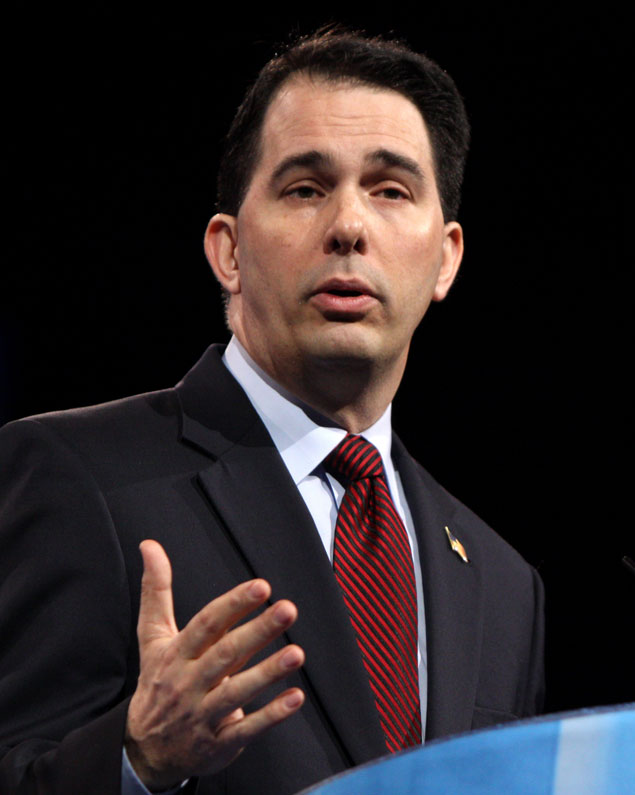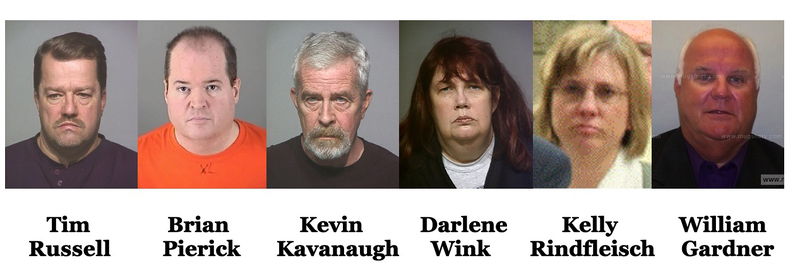Submitted by Mary Bottari on
 I spent the day reading Kelly Rindfleisch's emails. They were released as part of the final court proceedings regarding the first John Doe, the closed-door, criminal investigation of Scott Walker's staff during his time as Milwaukee County Executive and running for governor in 2010.
I spent the day reading Kelly Rindfleisch's emails. They were released as part of the final court proceedings regarding the first John Doe, the closed-door, criminal investigation of Scott Walker's staff during his time as Milwaukee County Executive and running for governor in 2010.
One of the first things I spotted left me scratching my head. "Fortunately Milwaukee County Executive Scott Walker has decided that government in secret is not in the interest of taxpayers." This is from "gopfran" or Fran McLaughlin's email, Scott Walker's former Press Secretary. McLaughlin was given immunity for her testimony in the investigation, but clearly spent much of her time sending around campaign-related emails on the secret Wi-Fi system set up by Walker aides. (Transcript, pg. 53)
Thus began a sordid journey through some 30,000 pages of emails that helped convict six people, but left many wondering, why weren't more people charged?
The top five things you need to know about the emails from the first John Doe:
-
The Clear Policy: Walker has said repeatedly that while he was Milwaukee County Executive he had a clear policy against doing campaign work on the public dime, something that had repeatedly landed other state leaders in jail.
"Throughout all my time as the Milwaukee County executive, I had an expressed and clear policy that county employees -- in my office, in my Cabinet, elsewhere -- were prohibited from using county resources or county time to be involved in political activities," Walker said in 2012.
Yet, the emails showed that in 2010 while Walker was running for governor, corresponded consistently with key campaign and county staff from a private account in the middle of the work day and apparently on the secret Wi-Fi system set up by top aide Tim Russell. Some of these staff worked steps away from him on special campaign laptops, so the illegal activity could not be detected on the county computers. His chief of staff Keith Gilkes did the same, in one instance asking for donors lists from Rindfleisch in the middle of the day. (pg. 125727-8)
-
The Inner Circle: Cindy Archer, the number three administrator in the county government whose computers were seized by the FBI in a dramatic raid recorded by neighbors, welcomed Kelly Rindfleisch to the "inner circle" of staff working directly with Walker on a private email system during the work day. "Consider yourself now in the "inner circle". :) I use this private account quite a bit to communicate with SKW and Nardelli," Archer wrote. SKW refers to Scott Kevin Walker. "You should be sure you check it throughout the day." (pg. 144976) By doing county and campaign work on private emails and a secret Wi-Fi system, participants were also apparently attempting to avoid Wisconsin's strong open records law, which requires even private emails to be released to the public when the public's business is being discussed.
The "inner circle" appears to have consisted of: Scott Walker and campaign staff Jill Bader, Keith Gilkes, RJ Johnson, Stephan Thompson, along with county staff Tom Nardelli, Cindy Archer, Fran McLaughlin and Kelly Rindfleisch. Some of these people were included in 8 a.m. daily conference calls. And the emails show these staff working together to develop documents and respond to press, as well as many instances campaign staff asking county staff to do their work -- such as when Walker's campaign manager Gilkes asked Rindfleisch to do research for him (pg. 124891), or when Walker sends an email (pg. 148908) to the inner circle suggesting the use of county resources to attack Tom Barrett who would run against him for governor, or when Walker asks county employee Archer to do research to counter an attack by his primary challenger, Mark Neumann (pg. 149577). Under Wisconsin law you are not allowed to solicit public employees for any political service during "established hours of employment" or while they are engaged in official duties.
-
Illegal Fundraising for Governor and Lt. Governor Candidates: Rindfleisch was charged with spending about half her time organizing fundraisers for Lt. Gov. candidate Brett Davis (who was never charged in the John Doe even though he corresponded with Kelly during work hours). But the emails make clear that Rindfleisch spent a boatload of time in direct communication with Walker campaign staff as well. According to prosecutors, Rindfleisch sent and received 3,486 emails from representatives of Friends of Scott Walker, the vast majority during regular work hours. Newly-revealed affidavits show that Rindfleisch was tailed by detectives for days and had computers, cell phones and more seized in the investigation (Affidavit for Search Warrant). Rindfleisch, who pled guilty to official misconduct in 2012, was sentenced to six months in jail and three years of probation. The emails were released as part of her appeal.
The other county staffer spending a lot of public time working to get Walker elected governor and aiding the Republican Party was Darlene Wink. In an Affidavit in Support of a Request for a Search Warrant (Exhibit E) there is a summary of Wink's emails which show her forwarding fundraising flyers and letterhead, discussing $1,000 donors for a Walker event and a release of endorsements, sending out party press releases, discussing bumper stickers and whether or not to print "brown bags" for distribution at fundraisers, and more campaign-related matters -- all while apparently on the county clock. Newly-revealed documents show that Wink may have deleted emails after some of her activities were uncovered by the Milwaukee Journal Sentinel in May 2010; investigators found a program called DFP, "Delete Files Permanently," on her laptop, and it was run just days after the story broke. In January 2013 Wink was pled guilty to fundraising for Walker while on the public payroll and was sentenced to a year's probation, 50 hours of community service and $1,000 in fines.
-
Coverup: When Milwaukee Journal Sentinel's Dan Bice broke the news that Wink had been caught commenting on news articles in a partisan fashion during work hours and Walker was notified, he sent an email to trusted aide Tim Russell: "I talked to her at home last night. Feel bad. She feels worse. We cannot afford another story like this one. No one can give them any reason to do another story. That means no laptops, no web sites, no time away during the workday, et cetera." That email then was forwarded by Walker campaign confidante Jim Villa to Rindfleish. "Rindfleisch replies quickly to Villa. ... 'Already broken down and put away. Laptop is packed. I already saw this e-mail,'" Investigators tell the judge: "The significance of this e-mail," he added, "is that it shows that the county executive would appear to be aware that laptops were used in the County Executive's Office for accessing things on non County networks."
"And it also is very significant because it shows that the various members of the County Executive staff worked in concert to conceal laptops and/or networks -- wireless networks that were in existence in that office suite, and these items were not present when we did our search warrant later in the day on May 14, 2010." In a follow-on email, Rindfleisch tells Russell, "I took down the wireless, it's in my bag for now." (Transcript, pg. 79-82) Later Cindy Archer tells the inner circle "in light of recent events I will no longer be using this email account during the work day. We discussed this among CEX staff this morning and were unable to find alternatives." Prosecutors note that this indicated that the inner circle were working in concert and is an admission that Archer was using the secret email during the workday. But the inner circle continued to communicate using private email accounts during regular work hours.
-
Walker in Charge: Repeated emails from Walker show that he was a hands-on manager of the "inner circle," with chief campaign advisor R.J. Johnson a close second. When news of the Wink improprieties broke, Walker wrote to top staff. "Here is my thought for a statement from Tom: 'Darlene Wink violated the policy of this office. Neither me, the County Executive nor his campaign authorized her actions. When I confronted her about these actions, she offered her resignation.'" (pg. 149008). The final statement, which was run by Walker, reads: "No one in our office had any knowledge that Darlene was posting any comments during work hours. The county executive and chief of staff expressly forbid staff participation in any campaign-related activity while on county time." (pg. 148966).
While right-wing media have consistently described the John Doe investigation as a partisan fishing expedition, after reading the emails many reporters like WISN's Colleen Henry have wondered, why weren't more people charged under Wisconsin's misconduct statute or related laws?
Kelly Rindfleisch is only one of a cast of characters involved in the activities detailed, and the release of these records are only part of the picture. There are many more emails in the possession of participants and prosecutors that have not been released and paint a clearer picture of these events of great public interest, especially since another John Doe regarding political spending during the recall races is underway. It is past time for the secrecy order on the first John Doe to be lifted and for all the evidence to be made public.


